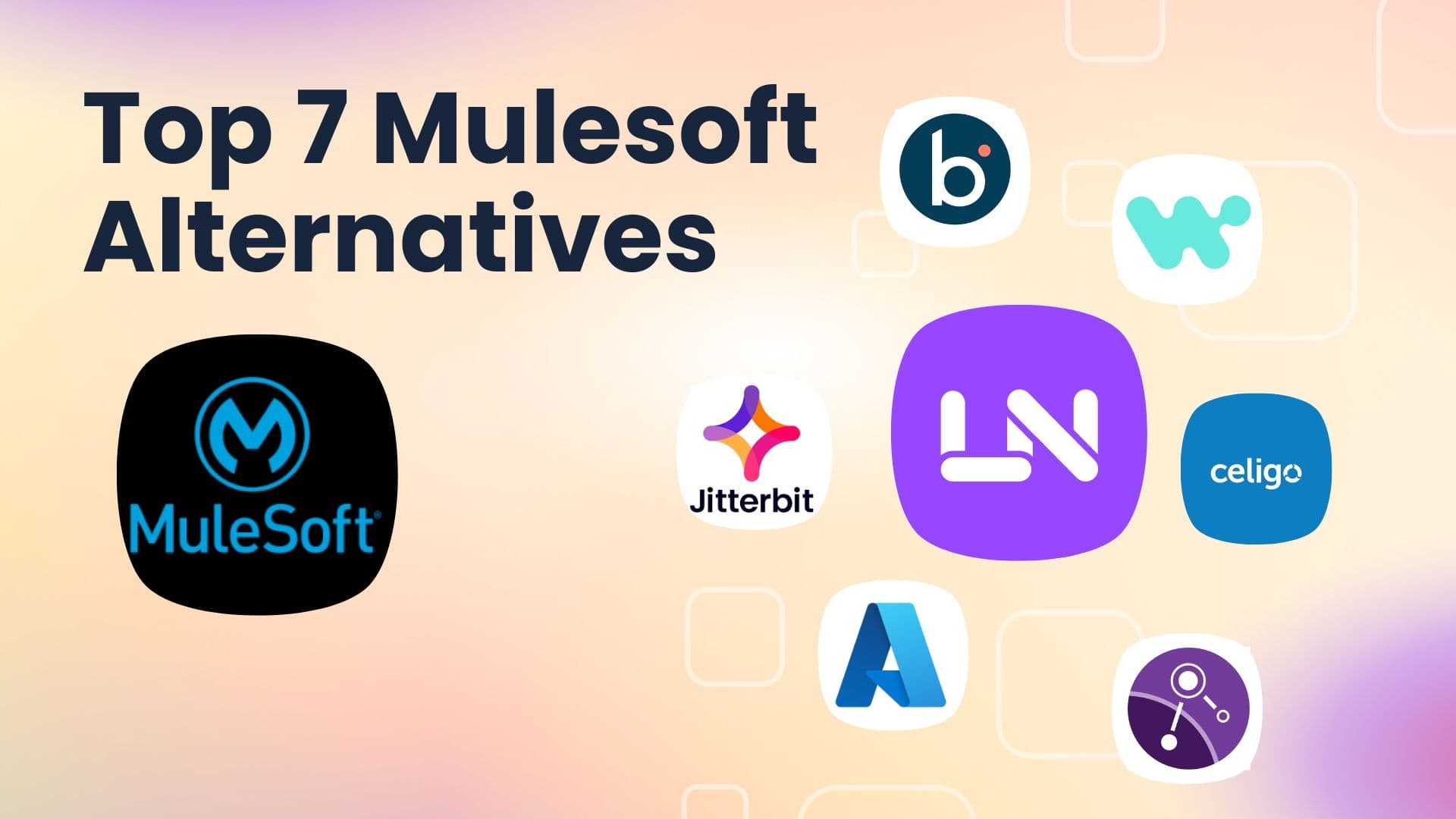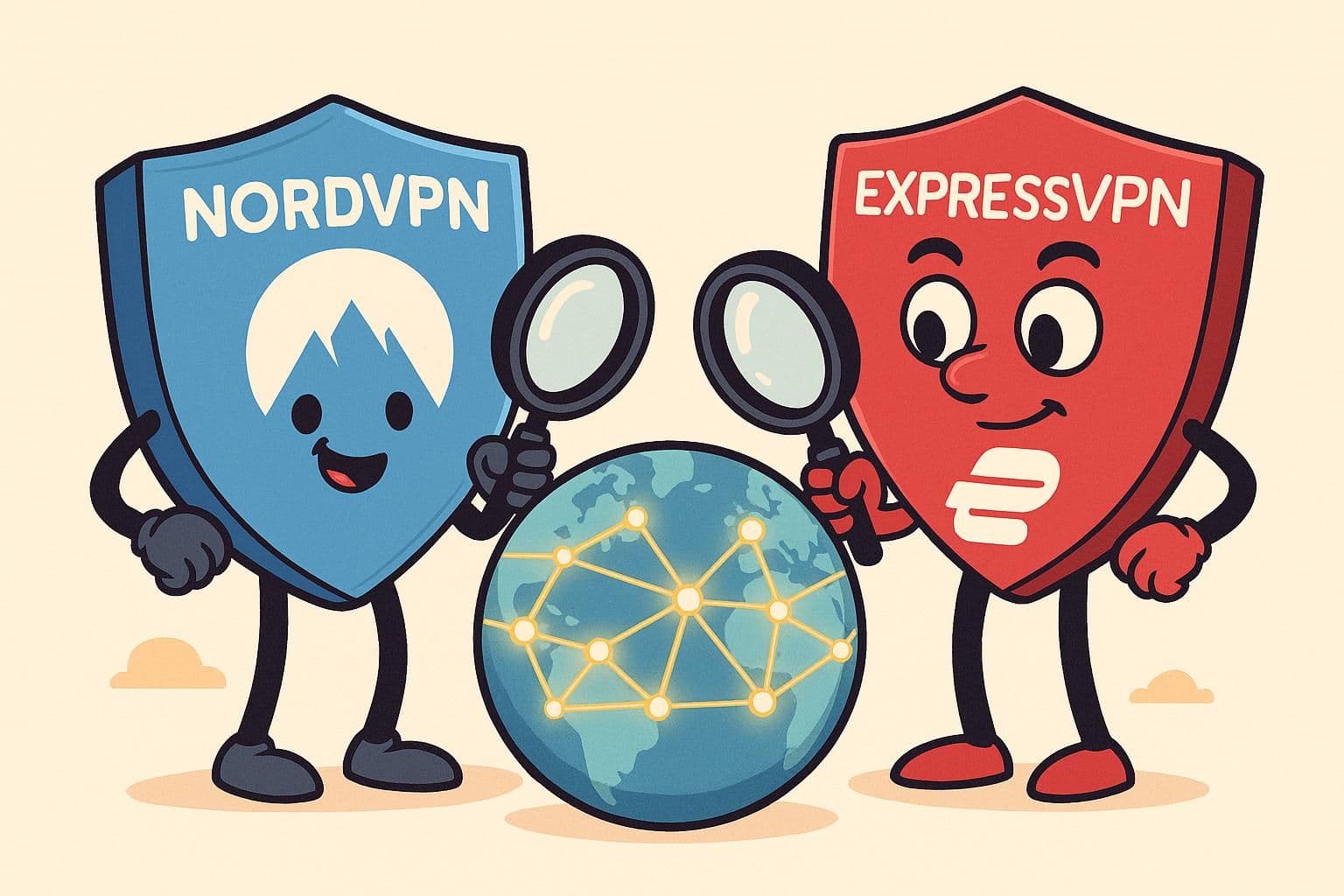Top 7 Mulesoft Alternatives
The Best MuleSoft Alternatives for Scalable Integration Solutions

Connecting various applications and data can be a daunting challenge for IT departments. The need to seamlessly integrate numerous office, cloud, and industry-specific software can often lead to complex and time-consuming processes.
Amidst this complexity, organizations are turning to solutions that bridge the gap between products and services. By integrating an email and archiving app, a sales funnel with manufacturing, or any of the countless possible connections, businesses can gain a comprehensive overview, automate workflows, and significantly enhance productivity.
Digitalization is slowly erasing the difference between IT companies and all others. Information technology is becoming an essential part of all industries, which is reflected in digital transformation statistics. Statista says investment in digital transformation will reach $3.9 trillion by 2027.
MuleSoft, a leading automation building and integration solutions provider, empowers IT teams to streamline their work, freeing up time for more strategic tasks.
What is MuleSoft software?
![]()
Salesforce acquired MuleSoft because of its market-leading features, which have since been matched or even topped by MuleSoft alternatives. However, that doesn't diminish this comprehensive solution, which provides automation tools.
Whether it's integrating data and systems or automating workflow or process, MuleSoft software simplifies the complex. It's a single platform that enables IT departments to create efficient shortcuts, ensuring a smooth and hassle-free integration process.
This solution allows teams to integrate systems and data, drive the company's efficiency with automation, and even create new digital experiences.
Why Mulesoft is popular?
MuleSoft combines several technologies to achieve this feat. It offers API connectivity that can connect any solution with a workable API. The software uses iPaaS principles, has advanced automatic data mapping using RPA (robotic process automation), and uses the Anypoint platform, a centralized hub for integration and data management.
Anypoint Studio has integrated IDE, making software development easier for IT management. The platform also has real-time monitoring that allows tracking of key metrics and issues.
Extensive Repository provides a wide array of pre-designed APIs, connectors, templates, accelerators, and additional integration resources. Furthermore, you can recycle integration resources, governance protocols, and other optimal methodologies.
Why consider MuleSoft alternatives?
One key drawback of this robust solution is pricing. Because it is aimed at corporate clients, its high cost makes MuleSoft among the most expensive integration tools. It has gold, platinum, and titanium pricing plans, and smaller companies or SMBs may look for alternatives to MuleSoft. But it's not the only potential disadvantage.
- Difficult to learn - Unlike no-code or low-code solutions, MuleSoft requires a steep learning curve and a team of skilled developers to take advantage of Anypoint Studio.
- U I- one of the main concerns is the user interface, which many consider not user-friendly.
- Integration restrictions - MuleSoft has some limitations regarding cloud system integration or working with multiple systems simultaneously.
Top 7 MuleSoft competitors
Optimize your Business Process on Latenode – the best automation platform for you
Apps like MuleSoft are saturating the market, giving consumers more options. However, this can also mean confusion. To alleviate the research necessary to choose the best iPaaS solution, we devised a comprehensive list of top MuleSoft replacements.
1. Latenode
![]()
Flexibility and pricing options spearheaded the benefits of choosing Latenode, a low-code integration platform. While you can use no-code nodes in visual workflow builder in Zapier or Make.com style, Latenode also allows you to build and automate interactions between services with API.
Top Features
- Create and automate interactions between different services
- This solution uses an AI Assistant within its JavaScript node that can transform data in the way you need it and request it using natural language requests. Because of this module, AI Assistant can build API integration from scratch.
- Visual Canvas lets you create a structure of stickers, each one a node that processes data in your company's workflow.
- Aside from building integration, Latenode has a pre-built library that allows you to automate web interactions that don't have API.
- Another benefit of Latenode is its large community, which can provide support on Discord and robust customer support.
Pricing
Finally, Latenode has a cost-effective pricing model with options like lifetime deals or operation-based billing. Unlike some competitors, Latenode doesn't add charges for executing complex workflows, which makes it more budget-friendly. The solution comes with five pricing plans.
- The Free plan allows up to 12 computing hours and 1500 scenario executions with up to five active workflows.
- The Starter plan will cost you $17, granting 83 computing hours, 10.000 scenario executions, and 20 active workflows. It also gives you a three-day execution history and 100 requests for AI Code Copilot
- The Grow plan has 417 computing hours and 100.000 scenario executions for $97 monthly. It also gives you unlimited active workflows, 30 days execution history, and a basic teamwork feature
- The prime plan costs $297 and includes 1.5 million scenario executions, an enhanced teamwork feature, and more of everything.
- Dedicated success engineers, custom app integration, and security with private cloud are some of the Enterprise plan perks. You will have to ask for a quote for this tier.
2. Boomi
![]()
Boomi is a well-known MuleSoft competitor, a cloud iPaaS software that allows application and data integration. The solution also provides API management and master data management. As a reference, Boomi boosts itself as an integration platform with most customers.
Top Features
- The solution employs machine learning to learn and improve from over 200 million crowdsourced integrations.
- The platform offers flexibility in terms of deployment so that clients can choose between cloud or on-premise implementations.
- The leading benefits are an easy-to-use drag-and-drop user interface and a robust library of pre-built integrations and assets.
- It has a quality reporting console and can create low-code applications through an API-focused platform.
Pricing
The pricing plan starts with Professional, and each next tier adds layers of functionalities. You can also choose Pro Plus, Enterprise, and Enterprise Plus. Pricing is revealed through a quote from Boomi.
3. Jitterbit Harmony
![]()
Like many other MuleSoft alternative solutions, Jitterbit is a low-code iPaaS solution that lets you connect systems, build applications, or automate anything. With a centralized view of your company, Jitterbit allows easier control and workflow integration monitoring in real-time.
Top Features
- It is another drag-and-drop, low-code visual application builder on the market.
- Like other highly-ranked solutions, it has pre-built templates and integrations (recipes).
- Jittebit offers reusable pieces for integrations.
- Similarly to Boomi, the solution supports hybrid environments. You can deploy it in the cloud, work with legacy systems, or implement the solution on-premise.
- The platform is user-friendly for developers, who can easily create APIs and executions and conduct thorough analyses.
Pricing
There are three pricing tiers: standard, professional, and enterprise. Each has different features and task volumes. All three require a direct quote from Jitterbit.
4. Microsoft Azure Integration Services
![]()
Azure Integration Services is a logical app integration and connectivity choice if your company relies on Microsoft solutions. The IT team will be familiar with the technology, and native support will make it easier to connect various services.
Top Features
- You can create workflows and manage business processes by connecting hundreds of supported services.
- Microsoft AIS allows you to connect on-premise with cloud-based applications and services while maintaining high security.
- Azure Integration Services can connect third-party services using the Event Grid app.
- Azure Data Factory can visually integrate data sources to create ELT processes. There are over 90 pre-built connectors for various data pipelines.
Pricing
All pricing depends on the features and services and is custom to every client. The pricing structures offer choices between a single-tenant model (Standard plan) and a multi-tenant setup (Consumption plan), allowing customers to select between hourly or monthly billing options.
5. IBM App Connect
![]()
Suppose you want to connect SaaS solutions and business intelligence software like various ERP or CRM solutions with data stores and other products. In that case, IBM App Connect enables organizations to do so with the help of AI-based options.
Top Features
- App Connect allows different types of integration processes, including API, synchronization, event-led, and various others.
- IBM APP Connect has a no-code interface allowing easy connectivity with one click.
- IBM is agnostic in terms of deployment and can support on-premise, hybrid, and cloud solutions.
Pricing
IBM has three pricing options for its comprehensive integration service.
- App Connect Enterprise as a service flow runs starting at $200 monthly, and your organization will be charged based on the number of times your integration flows are invoked.
- App Connect Enterprise as a service runtime compute capacity edition is the most popular option, according to IBM, with a monthly fee of $667. You will pay for each hour a virtual core processor is available to your service.
- The enterprise plan has custom pricing and runs integration services as ESB or agile microservices. It is the only plan with hybrid cloud or multi-cloud deployment, container services on multiple platforms, and a custom number of resource units.
6. Workato
![]()
If you're looking for a popular Mulesoft replacement, Workato has an excellent reputation as a platform for integrations and automation. The platform allows app integration and has pre-built connectors, data integration, and events. It also comes with robust automation features.
Top Features
- Easy-to-use, no-code solutions that operate as a managed service. Without installation, you can run data pipelines and APIs to create workflows and custom business apps with a click.
- Workato uses AI to create Copilots that can build recipes and connectors.
- Common Workato Runtime can scale businesses, allowing unlimited loads, runtime optimization, and capacity.
- It is a single platform that can publish APIs and create data integrations, custom apps, and bots.
Pricing
Workato has custom pricing options that allow users to pay for one workspace and create unlimited recipes. As an additional option, you can add tasks, but for all pricing, you should contact their team.
7. Celigo
![]()
Celigo is another comprehensive solution for IT process automation. The fundamental idea is the same as that of some other MuleSoft competitors. Celigo allows connection between different systems, platforms, and databases.
Top Features
- Celigo has a visual model for data processing in Flow Builder, but you can go further with developer tools and customize solutions with JavaScript and stacks.
- Data loader supports hundreds of popular applications like Salesforce and other BI solutions.
- Celigo offers numerous pre-built integrations and connectors, API management, and advanced error management.
Pricing
Celigo doesn't reveal its pricing tiers, and you can try the platform for free. However, you will need a quote from the vendor for every implementation.
Conclusion
MuleSoft stands out as a leader in streamlined integration and automation processes, offering solutions that integrate different applications and services. Luckily for users, numerous quality MuleSoft alternatives with equally robust automation building and integration solutions can drive productivity.
Among these alternatives are competitors like Latenode, Boomi, Jitterbit Harmony, Microsoft Azure Integration Services, IBM App Connect, Workato, and Celigo, each offering unique features and pricing structures tailored to diverse needs.
Ultimately, each organization must carefully evaluate its requirements and select the best solution to advance its digital initiatives.
Optimize your Business Process on Latenode – the best automation platform for you



